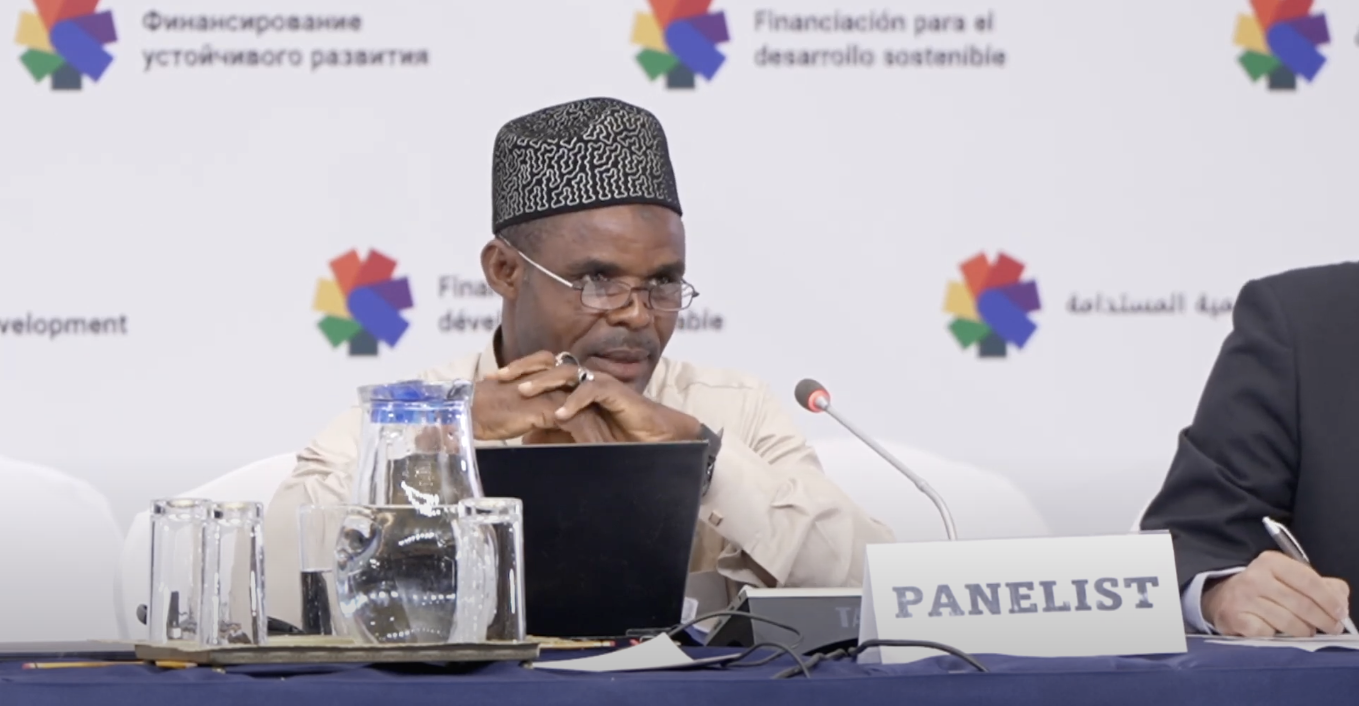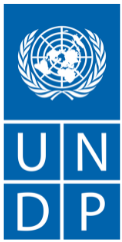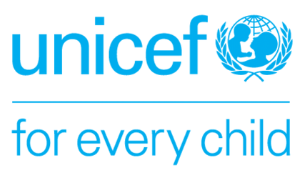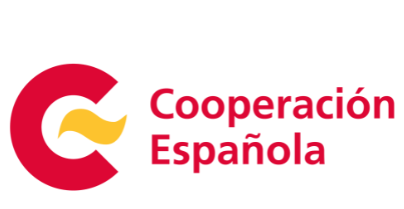Hon. Ali Malik Yakubu, Chief Economist, Ministry of Finance, Nigeria shared an overview of Nigeria’s INFF during the FfD4 first preparatory committee session on ‘Making Finance Work for People and Planet through Integrated National Financing Frameworks’ held on 23 July 2024 in Addis Ababa, Ethiopia
Mr. Yakubu shared insights on how Nigeria is leveraging its INFF to address macroeconomic imbalances, focusing on sustainable development goals (SDGs) and enhancing public and private financing. Nigeria's INFF implementation has made significant progress in areas including subsidy removal, tax administration, promotion of private sector investments and expanded social protection programs. Subnational governments like Gombe State also made progress, issuing green bonds and attracting investments, in line with the ongoing efforts to stimulate SDG-aligned investment across the nation.
The full transcript of the speech is attached below:
Thank you for the introduction.
And before I proceed, I would like to express my gratitude to the government and people of Ethiopia for the excellent facilities put at our disposal since our arrival in the beautiful city of Addis Ababa over the past two days.
Excellencies, ladies and gentlemen, I would like to present to you the implementation status of the INFF in my country Nigeria. Because, you know, following the contractions and even those of the unhealthy global development, the global economy, Nigeria had the need to take very proactive steps to address its macroeconomic imbalances. And then we saw the INFF as the next available flight and we boarded. Then Nigeria, as Tim pointed out, was one of the first countries to launch its INFF with great enthusiasm and expectations.
But along the line, there was a general election in 2023 with the government’s decision to conclude very bold reforms and that actually slowed down the initial momentum for the program because of the impact of the reform and then the time lag needed for the new government to settle in and then fashion out the policy direction. Nonetheless, on the rebound, the program has picked up. Then I've recorded a couple of milestones in its implementation. Well, in Nigeria, the SDG financing gap is estimated to be about $10 billion dollars annually. And to fill this gap, Nigeria's financing strategy is developed as an umbrella for the medium term revenue strategy and then the expenditure framework, and the fiscal federalism and the private sector reforms.
The INFF process adopted targets to expand the envelope for SDG financing and also enhance the sustainable development impact of public and private finance at both the national and subnational levels to address general development needs. The financing strategy also brings together the county's medium-term expenditure framework also and then the middle-term revenue strategy as well as the fiscal federalism framework. And aiming to strengthen tax administration and policy, the government is also targeting an increase in revenue to reach 15% of GDP as opposed to the current 10% revenue to GDP ratio.
And then, you know, the petro fiscal subsidy of our government actually came with a lot of unintended outcomes that have impacted on livelihood and then living conditions. And about then it was necessary because we found out that, before now, what the government was spending on subsidy payments exceeded what we spent on education, health and infrastructure, all three combined.
So then about $9.5 billion was saved by that singular policy of subsidy removal in 2023. All of these were targeted towards SDG project financing. Then there's also the forex management reform undertaken by the government. And like I said this was having unpalatable consequences on livelihood and in order to cushion this effect, the government has undertaken a lot of social protection programs in including the conditional cash transfer, to provide about 50 million household with about 75,000 every month. Further this program will also be extended to cover more households but this is a very huge task for Nigeria which as a country cannot achieve on our own so we require partnership.
In this regard, the World Bank has stepped in with a program of about $2.5 billion captured under the economic stabilization to enable transformation research development for the policy financial program and Nigeria accelerated resource mobilization reforms and the program for results. All of these are SDG aligned. Basically the two programs, the Nigeria accelerated resource mobilization reforms and then the program for reforms for results will complement domestic efforts to provide immediate financial and technical support in Nigeria's urgent needs to stabilize the economy and then scale up support for the poor and most vulnerable in our society.
Further improvement in tax auditing capacity, for example, has enabled more than $30 million in increased revenue collection alongside ongoing efforts to digitize tax administrative systems. The shift from one year fiscal policy to multi-year perspective then alignment of expenditure with the eight SDG priorities, enhancing the contribution of institutional investors and pension funds in SDG financing and leveraging remittances and diaspora investment reform policy in sectors such as artisanal and then small-scale mining and advance potential future green bonds issuances at subnational levels.
Indeed, more than half of the action in Nigeria's financing strategy focuses on private finance and improving the enabling environment and stimulating SDG-aligned investment projects. Also, efforts to unlock capital include, for example, the development of a $175 million pipeline of investments in SDG investment brokering across sectors including health, healthcare, agriculture and finance which to date already raised about $5.7 million dollars in new investments. Enhanced transaction advisory support to women and youth-led micro small and medium-sized enterprises and green businesses unlocked approximately $5.3 million dollars in assets for SMEs in 2023.
Then blended finance and public-private partnerships are being used to scale up investment in key areas and expand the impacts of capital by ensuring enhanced access for the most marginalized and furthest from the on sections of our populations. Also, the subnational government of Nigeria has also committed to INFF and their ongoing public finance initiatives in all the 36 states of the Federation and the FCT (Federal Capital Territory) to establish capacity to deploy SDG-aligned financial instruments.
For instance, there is the case of Gombe state in the northeastern part of Nigeria which as part of locally driven financial reform effort recently organized an investor round table and the establishment of an investment facility which resulted in two companies signing MoU for an investment valued at 14 billion Naira. That's equivalent to about 9 million dollars with the potential to create over 2,000 jobs.
In addition, the Gombe State Investment Promotion Agency had been established, with the state government issuing a 30 billion Naira green bond that's about 19 million on the Nigerian Stock Exchange in February 2024. The state government has also outlined plans to raise an additional 15 billion naira to bolster vital infrastructure in projects in the state. While Gombe State is one of the six states of a subnational government in Nigeria that works with subnational development finance assessments and the INFF action plan geared towards investment promotion is ongoing, underscoring the increasing momentum towards impactful development initiatives at local levels.
Other states, including Jigawa State, Zamfara State, Kebbi State have recognized the best practice of these initiatives and are toeing the line at an advanced level for preparations, including consultation with Nigeria INFF Steering Committee, domiciled in the Ministry of Finance. Also, other ongoing financing dialogue between policymakers, the private sector and crucially, representatives and advocates for the most vulnerable are a critical foundation for innovation and accountability, ensuring that the financial system enhances sustainability and inclusivity.
Well, one fascinating feature of the INFF is its tremendous scalability, potential and scope for social development impact. It is important that countries recognize the extensive fiscal space underpinned by the INFF and then explore them to deliver on development targets and progress. The Ethiopian integrated sustainable financing strategy which highlights how to align financing across humanitarian, development and peace. It is a very good reference point for many of us. Then the diverse and varying experiences shared in this regard over the past two days build a consensus around the value of country-related, impact-oriented and holistic financing strategies.
The task continues to develop more proactive and innovative home-grown initiatives to advance their development frontiers and catch up with SDGs including gender equity, poverty eradication, climate action, natural environment and of course human capital development. It is important in Africa that we work to promote sustainable agriculture which tackles hunger and poverty but at the same time does no damage to the environment.
The INFF could stand out as one of the clear successes of the Addis Ababa Action Agenda, while there is a need for bolder reforms and efforts to address financing and implementation gaps in a more coordinated way both at the national and international fronts. In this regard, it cannot be overstressed that the time has come for goodwill statements to really translate into goodwill actions. The challenges that confront us have become quite concerning. The fast approach of the end of the 2030 Agenda underscores the importance of inclusive and participatory processes for development, which lend credence to the assertion that development results are achieved when everything else works well together.
Well, it is important that was to look at the underlying reason for the call for the reform of the international financial architecture. You look at it that the LDCs (Least Developed Countries) and communities still operate only on the margins of global trade, thereby limiting their ability to build resilience. Consequently, international trade policies need to facilitate further opening up of international markets for exports and also foster progress in the process of trade liberalization. Ensuring a consistent approach to development is key, be it in terms of trade, defence, security and the environment, agriculture and finance.
Also the debt sustainability challenge, climate finance disparities and significant gaps in gender equality the art of reliable quality data and statistics on development indicators, as well as the inadequate social protection platforms across many countries of the third world, thus informing the case for the reform of the IFA (International Financial Architecture) as a matter of absolute necessity, as we prepare for the FfD4 to ensure that engagement between LDCs and donors foster cooperation in dialogue, negotiation, coordination and pushing mutual benefits and share the responsibility and adherence to international standards.
So the reform of IFA is necessary, is needed to strengthen multilateral development banks and enhance depth, sustainability and transparency, and then improve access to developing countries. We make a case for the launch of a new financing development initiative to support vulnerable countries such as debt for climate action and poverty eradication, and abolishing inequality for countries that have shown strong commitments in this regard. Then promoting stakeholder capabilities for better mobilization of domestic resources as well as the understanding and application of innovative financing instruments, including blended finance, green bonds and impact investing is also called for.
Then finally, it is also important to commit to improving integrity standards, limiting opportunities for corruption and then strengthening compliance programs. I mean, in this regard, a universal action is needed to build strong institutions in our member states to tackle corruption in all its forms, followed by adequate financing and a keen interest in the evolution and assessments of development pathways, and to improve the business environment for small and medium-sized enterprises.
I think I will stop here. Thank you.














